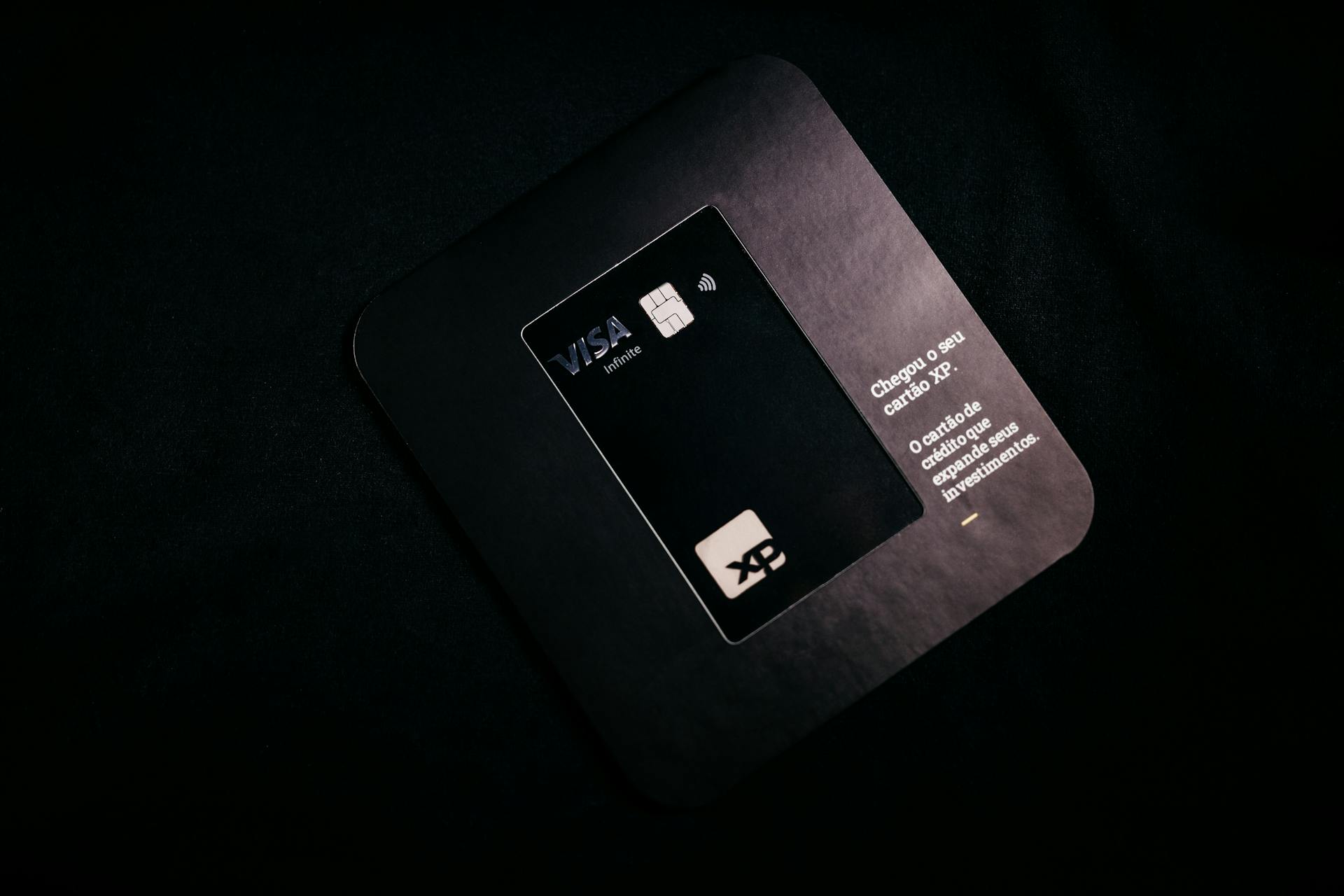
Brokerage accounts are a crucial tool for investors, allowing them to buy and sell securities with ease.
A brokerage account can be opened with a minimum amount of money, typically around $100, and can be funded with a one-time deposit or ongoing transfers from a bank account.
Investors can choose from various types of accounts, including cash accounts, margin accounts, and retirement accounts, each with its own set of rules and benefits.
Cash accounts, for example, require investors to pay the full amount for each trade, while margin accounts allow investors to borrow money from the brokerage firm to make trades.
What Is a Brokerage Account?
A brokerage account is a type of investment account that you can open with a brokerage firm. It's a way to hold, buy, and sell financial assets and publically traded securities.
You can use a brokerage account to invest in a variety of assets, including stocks, bonds, mutual funds, and more. Some examples of investments you can hold in a brokerage account include stocks, bonds, mutual funds, and exchange-traded funds (ETFs).
Unlike traditional bank accounts, the assets held in a brokerage account can't be withdrawn instantly. It may take a day or two before everything clears and you receive the funds after selling an investment.
Brokerage accounts are managed and operated by licensed financial institutions and investment platforms. Opening at least one brokerage account should be a key element of your financial plan to meet your financial goals.
Some popular types of investments you can hold in a brokerage account include:
- Stocks
- Bonds
- Mutual funds
- Exchange-traded funds (ETFs)
- Cryptocurrencies
- Commodities
- Real estate investment trusts (REITs)
Benefits and Features
A brokerage account is a great way to invest your money, and it offers several benefits and features that make it an attractive option. You can invest as much or as little as you want through a brokerage account, with no contribution limits.
One of the key advantages of a brokerage account is the large investment selection available. This means you can choose from a wide range of stocks, bonds, mutual funds, and other investment options to suit your goals and risk tolerance.
Brokerage accounts also offer high liquidity, making it easy to buy and sell securities as needed. This is especially important for investors who need to access their money quickly.
Here are some of the key benefits of a brokerage account:
- No contribution limits
- No restrictions on distributions
- Large investment selection
- High liquidity
- Ability to trade securities
In addition to these benefits, brokerage accounts often have no general requirements for contributions or withdrawals, giving you complete control over your investments.
Types of Brokerage Accounts
You can have multiple brokerage accounts, and different types of brokerage accounts serve different purposes. This allows you to tailor your investments to your specific financial goals.
There are two main types of brokerage accounts: individual and joint. An individual account has only one account owner, while a joint account has two or more account owners.
To choose the right brokerage account, consider your investment approach. Do you want a hands-on or hands-off approach? This will help determine whether an online brokerage account or a managed account is a better fit.
Types of
You can have multiple brokerage accounts, and different types of brokerage accounts serve different purposes.
There are several types of brokerage accounts to meet your financial goals, and you may even want to have multiple accounts to serve different purposes.
A full-service broker may be a good option for well-off individuals who want to manage all of their money, including personal loans, in one place.
Full-service brokerages are very hands-on, often having their own investment banking and research departments to provide the latest analyst recommendations, products, and access to IPOs.
However, with all of this personalized advice comes a big con: very high commission rates, and they may also charge an annual fee.
You may not get as much hands-on advice as you would from a full-service broker with a discount brokerage, which is a good option for investors who want to save money on trading and don't need as much personalized advice.
Discount brokers often offer commission-free trading and have a lot of trading and research tools since they cater to active investors and day traders.
Direct-access brokerage firms are also known as day trading brokers, catering to day traders and active investors, and speed and access are the top pros.
These firms often allow point-and-click executions and programmable hot keys, and complex stock and options orders can be placed on these platforms.
Joint brokerage accounts are more or less cash brokerage accounts that are opened by more than one person, it's like a joint bank account, in many respects.
Self-directed brokerage accounts can be cost-efficient because they offer the convenience of being able to buy stocks online without using a traditional full-service broker and the typical broker fees.
Custodial
Custodial accounts are a great option for parents who want to give their kids a head start on saving and investing, but don't want to hand over the reins just yet.

These accounts are held in the child's name, but are managed by an adult custodian until the age of maturity, which is 18 or 21 depending on the state.
You can set up a custodial account to help your child learn about financial responsibility and investing from a young age, and it's a great way to get them started on their financial journey.
The custodian will have control over the account until the child reaches the age of maturity, at which point the account will be transferred to the child's name.
Opening and Managing
Opening a brokerage account is a straightforward process that can be completed online in under 15 minutes. You'll need to be at least 18 years old to open an account, but parents can set up an account for their kids.
To get started, you'll need to deposit or transfer funds into your brokerage account, which is typically done by linking your bank account online. Some brokers may require you to verify a transaction by confirming a small deposit into your bank account.
You'll also need to decide whether to enable margin trading, which allows you to borrow money from the broker to make trades. However, this comes with interest charges and is generally considered riskier than using a cash account.
Here are some common fees associated with brokerage accounts:
- Commissions: Some brokerages charge commissions for buying or selling holdings.
- Maintenance fees: Many firms charge a small annual amount to maintain and service your account.
- Management fees: These apply to discretionary accounts where a professional makes investment decisions for you.
- Balance requirements: Some brokerages require minimum account balances to avoid additional fees.
You'll also want to consider the investment options available through the brokerage firm, such as stocks, bonds, and ETFs. Be sure to check if the firm offers the types of investments you're interested in and if there are any balance requirements or fees associated with them.
4 Steps to Open
Opening a brokerage account is a straightforward process. You can typically complete an application online in under 15 minutes.
To get started, you'll need to be at least 18 years old, but parents can set up a brokerage account for their kids. Once you've opened the account, you'll need to deposit or transfer funds before you can invest.

You can link your bank account to your brokerage account online, and some brokers may require you to verify a transaction by confirming a small deposit. After the transfer is complete and your brokerage account is funded, you can start investing.
Some brokerages may ask if you'd like to enable margin trading, but it's generally a good idea to stick with a cash account at first. Margin trading allows you to borrow money from the broker to make trades, but you'll pay interest and it's a riskier option.
Here are the key steps to open a brokerage account:
- Complete an application online in under 15 minutes
- Deposit or transfer funds to your account
- Link your bank account to your brokerage account online
- Verify a transaction (if required)
Managing Your Finances
Managing your finances is a crucial part of opening and managing a bank account. A good rule of thumb is to make a budget that accounts for at least 20% of your income for savings.
Keeping track of your spending is key to managing your finances. You can do this by categorizing your expenses, such as housing, food, and entertainment.

Aim to save at least $1,000 in an easily accessible savings account, like a high-yield savings account. This can help cover unexpected expenses and build your emergency fund.
Regularly reviewing your budget and making adjustments as needed is essential for staying on top of your finances. This can help you identify areas where you can cut back and allocate more funds to savings.
Having a clear understanding of your financial goals, such as paying off debt or saving for a specific expense, can help you stay motivated to manage your finances effectively.
Taxes and Fees
Brokerage accounts are taxable, and you'll likely have to pay income tax for the year, regardless of whether you withdraw assets from your account.
You'll pay capital gains taxes when you sell investments for a profit, which can be a significant consideration for long-term investors.
The good news is that long-term capital gains tax rates are often lower, ranging from 0% to 20%, depending on your taxable income and filing status.
To minimize taxes, it's essential to stay invested and hold onto your investments for over a year, as this can help you capture the most favorable tax bracket.
Here are the key tax implications to keep in mind:
- Capital gains tax applies when selling investments for a profit.
- Short-term capital gains tax rate is usually your ordinary income tax rate.
- Selling investments for a loss can help offset gains and reduce capital gains tax burden.
- Dividend income is taxable, even if you reinvest it.
- Capital gains taxes only apply when you've earned income on your investments.
Taxes
Taxes on brokerage accounts can be complex, but understanding the basics can help you navigate the process.
Brokerage accounts are taxable, meaning you'll likely have to pay income tax on withdrawals, regardless of whether you sell your investments or not.
The key to minimizing taxes is to hold onto your investments for over a year, which can help you capture the most favorable tax bracket.
If you sell a stock for a profit within a year of buying it, you'll have to pay short-term capital gains tax, which is usually your ordinary income tax rate.
On the other hand, selling an investment for a loss can help you offset some of your gains and reduce your capital gains tax burden.

You can use the losses to offset gains from other investments, but you can only do this up to a certain limit.
Here are the different tax rates for long-term capital gains:
It's worth noting that taxes are a signal that your investments are earning a return, which is good news.
Are FDIC-Insured?
FDIC insurance only applies to deposit accounts, such as checking and savings accounts, at participating banks.
Brokerage accounts, which hold investments like stocks, bonds, and mutual funds, aren't insured by the FDIC.
Vanguard accounts are protected by Securities Investor Protection Corporation (SIPC) insurance, which covers up to $500,000 in securities and up to $250,000 in cash if the firm fails.
This SIPC coverage is automatic and doesn't require any action on the part of Vanguard clients.
Online Trading Basics
Online trading should be easy, and it can be with the right tools. See what it looks like at Vanguard.
You can open a brokerage account quickly online, and many firms allow you to open an account with no upfront deposit. You will need to fund the account before you buy investments.

Brokerage accounts allow owners to buy and sell investments and financial securities. They are offered by a number of financial institutions, and come in a few different types.
You typically need a brokerage account to buy stocks, as brokers act as intermediaries between investors and the stock market. Brokers facilitate the buying and selling of stocks on your behalf.
You can open more than one brokerage account, and there's no limit on the amount of money you can put into a taxable brokerage account each year. There should be no fee to open a brokerage account.
Here are some popular brokerage firms and their features:
You can buy and sell assets, choose an investment style, access advanced investments, reinvest dividends, set up recurring investments, and track and manage your portfolio with a brokerage account.
Risks and Considerations
When investing, you may encounter certain risks, and it's essential to understand them before getting started.

Market risk is a significant concern, as the value of your investments can fluctuate based on market conditions. This means your portfolio may experience ups and downs, regardless of the potential for high returns.
Fees can also eat into your investment returns, including transaction fees, account maintenance fees, and hidden charges. It's crucial to review the fee structure carefully to ensure it aligns with your investment goals.
Most U.S. brokerage accounts are protected by the Securities Investor Protection Corporation (SIPC), which may safeguard your investments if your broker fails. However, SIPC does not protect against market losses, only broker failure.
Some common risks your portfolio may face include liquidity, market, political, business, inflation, credit, and currency risks. These risks can impact your investments in various ways, and it's essential to be aware of them.
Here are some specific risks to consider:
- Market risk: The value of your investments may rise or fall depending on market conditions.
- Fees: You may be charged various fees, such as transaction fees, account maintenance fees, or even hidden charges.
- Regulatory protections: Most U.S. brokerage accounts are protected by the Securities Investor Protection Corporation (SIPC).
Popular Brokerage Options
To choose a brokerage account, you must open a brokerage account with a brokerage firm.

There are different types of brokers to consider, including full-service brokers and discount brokers.
Full-service brokers offer personalized investment advice and a wide range of financial products, but often come with higher fees.
Discount brokers, on the other hand, offer lower fees and a more self-directed investment experience.
You should consider your investment goals and risk tolerance when deciding between these options.
Full-service brokers are often better suited for beginners or those who need more guidance, while discount brokers are better for experienced investors who want to save money.
Getting Started
You typically need a brokerage account to buy stocks, as brokers like Vanguard act as intermediaries between investors and the stock market.
You can open a brokerage account with a minimal initial deposit, but some firms may require you to fund your account to cover the cost of stocks or bonds, as well as any commission fees.
To make your first investment, you can deposit money from another account, such as your checking or savings account. You can then use the brokerage firm to execute buy or sell orders on stocks, ETFs, bonds, or mutual funds.
Get Up to $1,000 in Stock When You Fund

Getting up to $1,000 in stock when you fund a new account can be a great way to get started with investing. You can fund a new Active Invest account and get up to $1,000 in stock, as mentioned in a brokerage firm's promotion.
Some brokerage firms require an initial deposit to open an account, but others don't. You can deposit money to fund your account by moving it from another account, such as your checking or savings account.
You don't need to worry about restrictions on how much money you can put in or when you can withdraw your cash from a brokerage account. You can typically put in as much money as you want and withdraw it at any time.
To make your first investment, you'll need to deposit money into your account. Some brokerage firms offer commission-free online trading, which can help you save money on fees.
You'll need to claim any profits, or capital gains, as taxable income when you withdraw them from your account. This is an important thing to keep in mind as you start investing.
Best for Beginners

Getting started with investing can be intimidating, especially for beginners. A standard brokerage account is often considered the best for beginners because it is simple.
You won't risk more than you have on hand, making it a low-risk option.
Specialized Accounts
Specialized accounts offer a range of benefits, including tax advantages and professional management.
With a custodial account, you can open an account for a minor, allowing them to invest in the stock market while minimizing taxes and ensuring adult oversight.
A trust account, on the other hand, allows you to transfer assets to a trusted individual, providing a secure and stable investment vehicle for beneficiaries.
Vanguard IRA
Vanguard IRA accounts offer tax-advantaged retirement savings. This means your earnings can grow tax-deferred or tax-free within the account.
Withdrawals from traditional IRAs after age 59½ will be taxed as ordinary income, which is a key consideration for retirement planning.
The annual contribution limit for 2025 is $7,000, or $8,000 if you're age 50 or older, providing a clear guideline for contributions.

Withdrawals from Roth IRAs that have been owned for at least 5 years and at age 59½ or older are tax-free, which can be a significant advantage for some individuals.
Withdrawals before age 59½ may be subject to a 10% penalty tax, so it's essential to understand the rules around early withdrawals.
Vanguard 529
The Vanguard 529 is a popular college savings plan that allows you to set aside funds for education expenses.
You can open a Vanguard 529 account with just $3,000, or $1,000 if you're a Nevada resident.
The plan offers a wide range of investment options, with portfolios comprised of different Vanguard mutual funds.
You can make additional investments as low as $50, and the maximum contribution limit is $500,000.
If you withdraw funds from a 529 account for nonqualified education expenses, you'll face a 10% penalty tax in addition to federal income tax on earnings.
Retirement
Retirement accounts are tax-advantaged, meaning your earnings can grow tax-deferred or tax-free within the account.
The annual contribution limit for 2025 is $7,000, or $8,000 if you're age 50 or older, which can help you plan for your retirement.
Withdrawals from traditional IRAs after age 59½ will be taxed as ordinary income, so it's essential to consider this when planning your retirement.
You may be able to get additional tax deductions for money deposited into a retirement account, but withdrawals are usually limited until you reach a certain age.
Withdrawals from Roth IRAs that have been owned for at least 5 years and at age 59½ or older are tax-free, which can provide a significant advantage in retirement.
Retirement accounts, such as 401(k)s and traditional and Roth IRAs, have specific rules about the amount that can be contributed and when money can be withdrawn, so it's crucial to understand these rules before investing.
Brokerage accounts are not tax-advantaged, and you'll be liable to pay capital gains taxes on most of your profits from trading securities, which can be a significant drawback.
Frequently Asked Questions
How much money do you need to open a brokerage account?
You don't need to deposit money upfront to open a brokerage account, but you'll need to fund it before buying investments. The initial deposit amount is typically $0, but you'll need to transfer funds from a linked account to start trading.
What is the meaning of securities account?
A securities account is a type of account that holds financial assets such as stocks, bonds, and other securities on behalf of an investor. It's typically held with a bank, broker, or custodian and used to buy and sell securities.
What is the difference between a bank account and a securities account?
A bank account holds cash and provides money-managing tools, while a brokerage account holds investments like stocks, bonds, and mutual funds. Understanding the difference is key to managing your finances effectively.
Is a Roth IRA a securities account?
A Roth IRA is a type of investment account that allows you to invest in securities, but it's specifically designed for long-term savings and has tax benefits. If you're looking for more information on how a Roth IRA works, keep reading.
Is an IRA a securities account?
Yes, an IRA (Individual Retirement Account) is a type of account where you can invest in securities, such as stocks and bonds. However, the tax implications and investment goals for IRAs differ from traditional brokerage accounts.
Sources
- https://www.nerdwallet.com/article/investing/what-is-how-to-open-brokerage-account
- https://www.businessinsider.com/personal-finance/investing/what-is-a-brokerage-account
- https://investor.vanguard.com/accounts-plans/brokerage-accounts
- https://public.com/learn/what-is-a-brokerage-account
- https://www.sofi.com/learn/content/what-is-a-brokerage-account/
Featured Images: pexels.com


